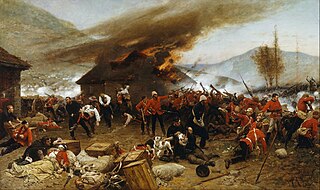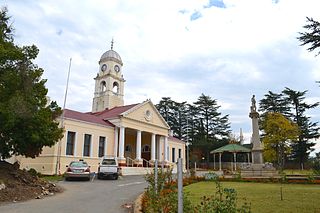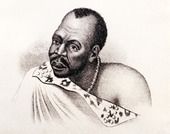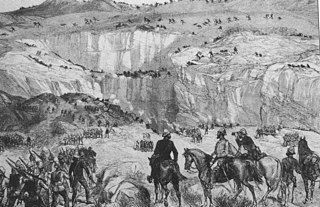
The Battle of Rorke's Drift (1879), also known as the Defence of Rorke's Drift, was an engagement in the Anglo-Zulu War. The successful British defence of the mission station of Rorke's Drift, under the command of Lieutenants John Chard of the Royal Engineers and Gonville Bromhead, 24th Regiment of Foot began when a large contingent of Zulu warriors broke off from their main force during the final hour of the British defeat at the day-long Battle of Isandlwana on 22 January 1879, diverting 6 miles (9.7 km) to attack Rorke's Drift later that day and continuing into the following day.

The Anglo-Zulu War was fought in 1879 between the British Empire and the Zulu Kingdom. Following the British North America Act of 1867 for the federation in Canada, by Lord Carnarvon, it was thought that similar political effort, coupled with military campaigns, might succeed with the African Kingdoms, tribal areas and Boer republics in South Africa. In 1874, Sir Bartle Frere was sent to South Africa as High Commissioner for the British Empire to effect such plans. Among the obstacles were the armed independent states of the South African Republic and the Kingdom of Zululand.

Sir Henry Bartle Edward Frere, 1st Baronet, was a Welsh British colonial administrator. He had a successful career in India, rising to become Governor of Bombay (1862–1867). However, as High Commissioner for Southern Africa (1877–1880), he implemented a set of policies which attempted to impose a British confederation on the region and which led to the overthrow of the Cape's first elected government in 1878 and to a string of regional wars, culminating in the invasion of Zululand (1879) and the First Boer War (1880–1881). The British Prime Minister, Gladstone, recalled Frere to London to face charges of misconduct; Whitehall officially censured Frere for acting recklessly.

King Cetshwayo kaMpande was the king of the Zulu Kingdom from 1873 to 1879 and its Commander in Chief during the Anglo-Zulu War of 1879. His name has been transliterated as Cetawayo, Cetewayo, Cetywajo and Ketchwayo. Cetshwayo consistently opposed the war and sought fruitlessly to make peace with the British, and was defeated and exiled following the Zulu defeat in the war. He was later allowed to return to Zululand, where he died in 1884.

King Goodwill Zwelithini kaBhekuzulu was the reigning King of the Zulu nation from 1968 to his death.

The Battle of Isandlwana on 22 January 1879 was the first major encounter in the Anglo-Zulu War between the British Empire and the Zulu Kingdom. Eleven days after the British commenced their invasion of Zululand in Southern Africa, a Zulu force of some 20,000 warriors attacked a portion of the British main column consisting of about 1,800 British, colonial and native troops with approximately 350 civilians. The Zulus were equipped mainly with the traditional assegai iron spears and cow-hide shields, but also had a number of muskets and antiquated rifles.

Kokstad is a town in the Harry Gwala District Municipality of KwaZulu-Natal Province, South Africa. Kokstad is named after the Griqua chief Adam Kok III who settled here in 1863. Kokstad is the capital town of the East Griqualand region, as it is also the biggest town in this region. It was built around Mount Currie, a local mountain range, by the city's founder Adam Kok III, for whom the town is named. Stad is the Dutch and Afrikaans word for "city".

Zulu Dawn is a 1979 American adventure war film about the historical Battle of Isandlwana between British and Zulu forces in 1879 in South Africa. The screenplay was by Cy Endfield, from his book, and Anthony Storey. The film was directed by Douglas Hickox. The score was composed by Elmer Bernstein.

Hintsa ka Khawuta, also known as Great or King Hintsa, was the king of the Xhosa Kingdom, founded by his great ancestor, King Tshawe. He ruled from 1820 until his death in 1835. The Xhosa Kingdom, at its peak, during his reign stretched from Mbhashe River, south of Mthatha to the Gamtoos River, in the Southern Cape.

Nozizwe Charlotte Madlala-Routledge is a South African politician who was South Africa's Deputy Minister of Defence from 1999 to April 2004 and Deputy Minister of Health from April 2004 to August 2007. President Thabo Mbeki dismissed her from the Cabinet on 8 August 2007, after which she maintained her role as a member of parliament representing the African National Congress. On 25 September 2008, she became Deputy Speaker of the National Assembly, serving in that capacity until resigning from Parliament in early May 2009. She has been a member of the South African Communist Party since 1984.

The Zulu Kingdom, sometimes referred to as the Zulu Empire or the Kingdom of Zululand, was a monarchy in Southern Africa that extended along the coast of the Indian Ocean from the Tugela River in the south to Pongola River in the north.
Bhaca, or IsiBhaca (Baca) is a Bantu language of South Africa. Traditionally considered a dialect of Swati, it is closer to Zulu, Phuthi and Xhosa. It is spoken southeast of Lesotho, where Sotho, Xhosa and Zulu meet, mainly around Mount Frere, Mzimkhulu, and to a lesser extent in Mount Ayliff, Matatiele, Harding, Bulwer, Underberg, Highflats, Umzinto, Umzumbe and Ixopo.
Frere Hospital is a large, provincial, government funded hospital situated in East London, Eastern Cape in South Africa. It was established in 1881 and is a tertiary teaching hospital. Frere Hospital is named after Sir Henry Bartle Frere, Governor of the Cape Colony from 1877 to 1880.
Glen Grey Provincial Hospital is a Provincial government funded hospital for the Emalahleni Local Municipality area in Lady Frere, Eastern Cape in South Africa.
Mount Ayliff Hospital is a Provincial government funded hospital in Mount Ayliff in the Alfred Nzo District of the Eastern Cape Province of South Africa.
Ceza is a town in Zululand District Municipality in the KwaZulu-Natal province of South Africa.
King Madzikane was the founder and a King of the amaBhaca Nation.

The 12 January 1879 action at Sihayo's Kraal was an early skirmish in the Anglo-Zulu War. The day after launching an invasion of Zululand, the British General Lord Chelmsford led a reconnaissance in force against the kraal of Zulu Chief Sihayo. This was intended to secure his left flank for an advance on the Zulu capital at Ulundi and as retribution against Sihayo for the incursion of his sons into the neighbouring British Colony of Natal.

Sibongiseni Dhlomo is a South African politician for the African National Congress. Dhlomo is the current deputy minister of health for the Republic of South Africa.













